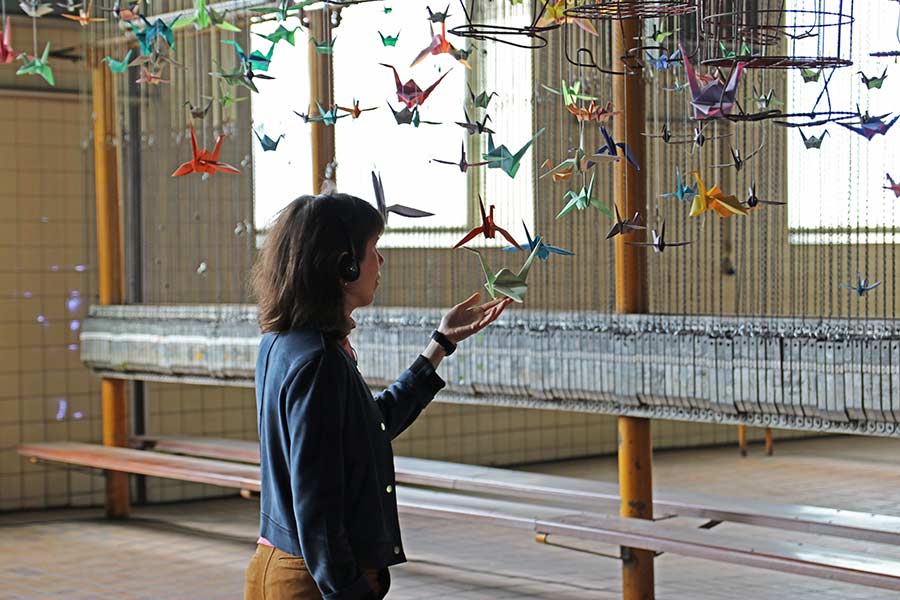Representatives of coal mining communities of the Donetsk region together with Ecoaction visited the Ruhr region of Germany looking for ideas for green recovery. Ecoaction is a partner organisation of the Platform for Sustainable Development of Coal Towns of Donetsk region, and this cooperation has been helping coal towns to find sustainable development alternatives since 2018. In particular, such trips are useful for sharing experiences on how sustainable development and restoration of coal mining areas can take place.
As part of the exchange programme of the Initiative for coal regions in transition in the Western Balkans and Ukraine, the delegation visited the towns of the Ruhr region that are transforming after phasing out hard coal and switching to renewable energy sources. The Ruhr area is particularly known for transforming from an industrial coal region into a science-based one, where the majority of the population now works in the service sector. The region is focusing on the reuse of former industrial sites, soil remediation and water treatment while continuing to search for a new urban identity. The delegation visited such towns as Zarbeck, Ibenburen, Gelsenkirchen and Herten, and Bochum.
Zarbek – an active climate community
Zarbeck is a town that in 2013 covered 100% of its electricity needs with renewable energy sources. In addition, the local population is involved in the energy transition process through participation in discussions, creation and implementation of projects, joining an energy cooperative, and through educational programmes (from the youngest to university students). The main projects that have been implemented or are being implemented are the installation of solar panels, a bioenergy park on the site of a former ammunition depot, and decarbonisation of heating. The community is currently planning to switch to district heating from renewable energy, and part of the reasoning behind it is because Russia’s gas blackmail and the increase in gas prices due to Russia’s invasion of Ukraine.
“If there were more communities like this, the world would be safer,” says Oleksandr Brykalov, mayor of Myrnohrad.
Ibenburen – a town in search of better solutions to the “eternal question” of maintaining water levels in a mine
The last mine in Ibenburen was closed in 2018. The miners either retired prematurely or found new jobs with the support of the union and the coal company. The technology that the city plans to use to pump out the mine water involves keeping the water level at a certain depth to minimise water pollution and treatment costs. In the future, the area is to be transformed into an industrial park, with space not only for industry and green areas for recreation, but also habitats for species (such as bats and swallows) that previously inhabited the coal mine and surrounding buildings. Attracting new businesses is still a long way off, and the landscaping work is already underway.
“We want to leave behind clean nature, not scorched earth,” said a representative of Germany’s largest coal mining company, RAG.
Gelsenkirchen and Herten are towns in search of a new identity integrated with their mining past
The two cities exist together because their boundaries intersect in the industrial area between them, where former mines and a coking plant are located. The land in the area is highly contaminated due to the coal industry. In addition, there are still remnants of fuel oil contamination from the Second World War. Therefore, the community pays a lot of attention to soil restoration and parks, and in its vision of the future, it prefers to integrate the achievements of previous generations in combination with urban transformation.
“Life after coal goes on,” said Bernd Loze, CEO of the development company Neue Zeche Westerholt.
Bochum, a town heavily damaged by the Second World War and flooded mines, will now use mine water for heating
Bochum has undergone significant changes over the past century – including the transformation of the former mine sites. After the Second World War and the flooding of the mines, the Opel plant operated on this territory. But later, the production became unprofitable, and the owner could not leave the territory without carrying out reclamation measures. Now, the former mine site is home to an innovation centre, a space for investors and start-ups called Mark 51°7. It is also a university space for students and residents of Bochum who want to experiment and create their own projects. Currently, a heating and cooling system is being built on the site, which will be powered by the heat from the mine water.
These examples demonstrate how diverse the development of coal towns and former mine sites can be. The experience of the Ruhr region gives us hope that even after the mines were flooded, soils mined and contaminated, coal towns in eastern Ukraine can be rebuilt and reimagined using the best technologies. And Ecoaction continues to work on the transition of coal mining towns and their restoration – and perhaps in the future, our coal towns will also be visited for excursions.
Contacts for additional information:
Anastasiia Bushovska
ab@ecoaction.org.ua





